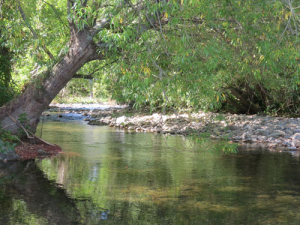Environment Canterbury urges buyers to check wastewater systems on rural properties
Buying or building a rural or semi-rural property? Make sure you know where the wastewater goes, says Environment Canterbury.
 Using misleading information to portray the whole dairy industry as guilty of polluting waterways is an old Greenpeace trick.
Using misleading information to portray the whole dairy industry as guilty of polluting waterways is an old Greenpeace trick.
Some newspaper headlines refer to a victory for Greenpeace, but is it?
Using misleading information to portray the whole dairy industry as guilty of polluting waterways is an old Greenpeace trick.
It has worked with the Advertising Standards Authority this time, unfortunately. Let’s hope DairyNZ’s appeal helps undo the injustice caused by the ruling.
DairyNZ lodged a complaint with the Advertising Standards Authority (ASA) late last year about a Greenpeace television advert.
The advert contained images and statements about rivers, industrial dairy farming, and irrigation, effectively saying dairying is the sole polluter of our waterways. Eleven other complaints about the advert were also received by the ASA.
DairyNZ is appealing the decision because it believes the information provided by Greenpeace in its response to the original complaint made by DairyNZ and other complainants is also misleading. Nor does it reflect any of the information DairyNZ provided to Greenpeace when they met in November, about the extensive work on dairy farms to protect the environment.
More such work is needed, but dairy farmers have made tremendous progress in fencing waterways, riparian planting, restoring wetlands and installing effluent management systems. Over the last five years farmers have spent at least $1 billion on this work – voluntarily. The countryside is where dairy farmers live and work, and they are great stewards of their environment.
Water measurement is succeeding, notably in Waikato and Manawatu, and to this long-term effort dairy farmers are fully committed.
Greenpeace has used the ASA ruling to garner media coverage. Right now it’s winning the publicity war.
Farmers must not take this lying down. As individual farmers, if you’re on social media and you have a good story to tell about the water quality on your farm, tell it.
Andrew Hoggard says Federated Farmers members have posted pictures of themselves drinking from farm waterways. “I have been amazed at the number of environmentalists, who supposedly want clean waterways, who get upset at seeing us in our clean rivers and drinking from them.”
A final decision on Greenpeace’s misleading advertisement is pending. It is basking in glory after winning this battle.
But let’s not let them win the war by spreading lies about the dairy industry.
Norwood has announced the opening of a new Tasman dealership at Richmond near Nelson next month.
Buying or building a rural or semi-rural property? Make sure you know where the wastewater goes, says Environment Canterbury.
With collars on more than seven million cows worldwide, Nedap says its standalone launch into New Zealand represents world-leading, reliable and proven smart technology solutions for dairy farmers.
The Meat Industry Association (MIA) is once again looking for game-changing ideas for New Zealand's red meat processing and exporting sector.
Environment Southland is inviting feedback on two bylaws that play a critical role in safeguarding the region's waterways and ensuring the safety of the local community.
While the North Island is inundated with rain, Southland is facing receding water levels as warm weather and lack of rainfall continues.